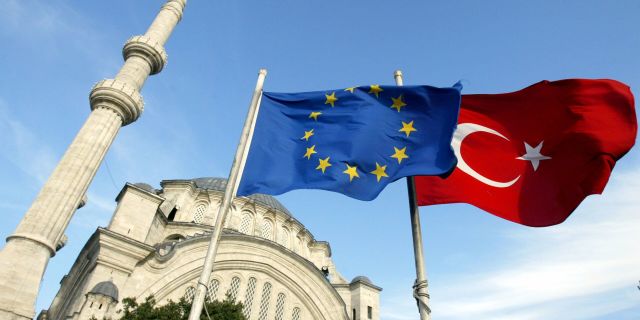Anadolu: Positive trends are emerging in EU-Turkey relations
During Trump's first term as president, relations between the United States and the EU deteriorated significantly, Anadolu writes. Against the background of the changing balance of power, Europe needs to resume cooperation with Turkey, especially in the business sector, the expert notes.
Selen Valente Rasquinho
Donald Trump's second week in power in the United States has begun. Concerns remain in Brussels about how the partnership between the United States and the EU, which they call "the strongest alliance in the world," will develop.
During Trump's first term, relations between the United States and the EU deteriorated significantly, and during his last election campaign, the US president also made alarming statements about the EU on many issues, from defense to trade.
Neither the positive signals from Brussels before Trump's inauguration, nor the statements "we look forward to working together" after it served as a reason for a warm start in relations.
Representatives of the European Commission confirmed that so far there have been no contacts between Trump and European Commission President Ursula von der Leyen.
Experts who spoke with the correspondent of the Anadolu news agency noted that the events that have taken place on the Brussels—Ankara axis since last year have revealed the need for cooperation and, against the background of a change in the balance of power under Trump, the EU should move closer to Turkey.
Amanda Paul, an expert on Turkey from the European Policy Center (EPC) think tank in Brussels, said in an interview with Anadolu: "Frankly speaking, the Trump presidency, in particular the potential reduction of US participation in NATO or the withdrawal of American forces from the eastern flank of the alliance, should actually open the door for more close cooperation between Turkey and Europe."
Stressing that it depends on political will, Paul continued: "Turkey's relations with the EU have been stagnating for a long time, despite many reasons for their improvement. Given factors such as instability in the area of the two sides' common neighborhood, we expected the EU to be ready to resume relations with Turkey in a truly appropriate manner."
Recently, there has been some improvement in relations, as evidenced by events such as the invitation of Turkish Foreign Minister Hakan Fidan to an informal meeting of EU foreign ministers in August 2024. In this regard, the expert noted: "Turkey occupies an important place in the world not only because of the Russian special military operation in Ukraine and its consequences for the Black Sea, but also because of what is happening in Syria, the Middle East, the South Caucasus, wherever one can imagine. Turkey has a foothold here, and the EU should start cooperating. So I think there's definitely some progress."
A number of EU member states oppose Turkey's participation in defense projects such as the Permanent Structured Security and Defense Cooperation (PESCO). "This is an incredible short—sightedness on the part of the EU," Paul added.
"Ankara needs to get some concrete results"
Amanda Paul mentioned the visit of the EU High Representative for Foreign Affairs and Security Policy Kaja Kallas to Ankara last week. A few days earlier, European Commissioner Hadja Lahbib visited Turkey, and at the end of 2024, European Commission President Ursula von der Leyen.
"But there should be a clear agenda," the expert believes. — We need a clear goal of what these negotiations are trying to achieve and what will happen after them. Ankara needs to get some concrete results."
Regarding the issue of modernization of the Customs Union between Turkey and the EU, Paul noted: "This issue has been discussed for a very, very long time, although it is in the interests of both Turkey and the EU, especially from a business point of view. European companies are very interested in this."
The expert said about Turkey's role in Ukraine and Syria: "The EU is looking for a more significant role, and Turkey is a very important player in Syria. Of course, as in the military conflict between Russia and Ukraine. Turkey has played a kind of mediation role. Neutral."
"It's best for the EU to keep Turkey on its side"
"Given the multitude of opponents around the world, it is probably best for the EU to keep Turkey on its side," says Giuseppe Spatafora, senior expert on transatlantic relations at the European think tank Institute for Security Studies (EUISS).
Spatafora recalled that von der Leyen gave positive signals during her visit to Ankara in December 2024.
According to him, many EU members and Turkey are working together under the auspices of NATO. Regarding Turkey's role in Ukraine, the expert said: "Turkey has not followed the example of other Western states and has not imposed sanctions against Russia. But at the same time, she was a good mediator, especially in the Black Sea Grain Initiative and other areas. In terms of defense, Turkey continues to be Europe's largest land power."
There are still problems in relations between Turkey and the EU on some issues, but they also contain potential opportunities that may open up with coordinated work. "The EU and Turkey obviously have the same interests in implementing the agreement in the Middle East (the cease-fire in Gaza) and stabilizing the situation in Syria. Both sides were happy with the fall of Assad and do not want Syria to plunge into chaos again," the source added.
EUISS Senior Analyst for Russia and its Eastern neighbors Ondrej Ditrich also touched upon Turkey's role in Ukraine, noting: "Turkey is interested in finding some kind of stable, sustainable and just solution to the conflict. I think there are some elements that are more directly sensitive or important to Turkey, such as the security of the Black Sea. I believe that this should also be part of some future settlement. Therefore, yes, Turkey will certainly play a role."

